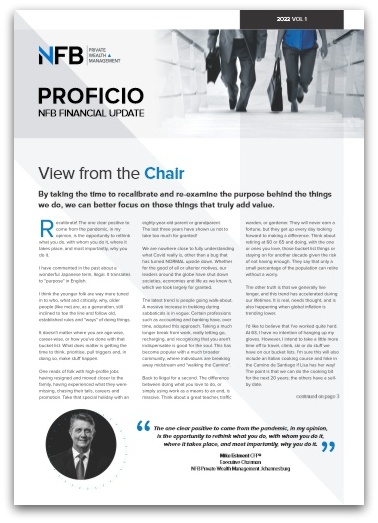Emigration and access to retirement annuities and preservation funds
A significant change in legislation will now require you to be a non-resident for South African tax purposes for at least three years before being granted early access to your retirement annuities or preservation funds.


While governments across the globe are easing Covid regulations and travel restrictions, issues of emigration and tax treatment are once again becoming increasingly topical. It is important to stay abreast of legislative changes and proposals and how these could impact your financial plan. From 1 March 2022, if you wish to access your retirement annuity (RA) because you have emigrated, you must have been a non-resident for South African tax purposes for at least three years. Similarly, suppose you have a preservation fund and have utilised the one withdrawal before age 55 - you must have been a non-resident for South African tax purposes for at least three years if you want to access the balance upon emigration. You may no longer follow the financial emigration process with the SARB if the withdrawal has not been concluded by 28 February 2022.
Ceasing to be a resident for South African tax purposes is based on the ordinarily resident test, physical presence test, and whether South Africa has a double tax agreement (DTA) with your present country of residence.
The ordinarily resident test
Naturally, you will be considered an ordinarily resident if your permanent home, which you usually reside in, is in South Africa. Below are some of the criteria used in determining one's ordinarily resident status:
- Individuals who permanently reside in South Africa
- Individuals who have their assets and belongings stored in South Africa
- Individuals who return to South Africa after their wanderings
You are deemed a tax resident if you pass this test. Should you fail the test, the physical presence test can also be done.
The physical presence test
To be a tax resident, you would have been physically present in South Africa for a period, exceeding:
- 91 days in aggregate during current the tax year under consideration;
- 91 days in aggregate during each year of the five tax years preceding the tax year under consideration; and
- 915 days in aggregate during the above five preceding tax years.
You are deemed a tax resident if you meet all three requirements above.
Double taxation agreements
Should you qualify as a resident under the ordinarily resident or physical presence tests, but deemed to be exclusively a resident of another country for purposes of a double tax agreement (DTA), you are not regarded as a resident for South African tax purposes.
DTAs are internationally agreed-upon legislation between South Africa and various countries to determine which country has the right to tax certain income. The purpose of these agreements is to ensure that every taxpayer is being taxed according to the tax laws of their present country of residence, and to enforce the correct rights upon these taxpayers. If both countries tax the same income, a DTA will determine that the resident country must allow a tax credit limited to the tax paid in the foreign country.
Retirement annuities and preservation funds
Early access to retirement funds is allowed under certain circumstances:
- Retirement at age 55 (RAs)
- One partial or full withdrawal, depending on the fund rules, before age 55 (preservation funds)
- Divorce order
- You become permanently disabled
- The fund balance is less than R15,000 (RAs)
- After being a non-tax resident for three consecutive tax years
When does the three-year period start?
The three-year period starts when you inform SARS of your ceasing to be a tax resident, which is to be done in the year you become a non-tax resident. You can inform SARS by submitting your normal income tax return or a Declaration of Cease to be a Tax Resident. If you have already left South Africa but have not informed SARS, you need to inform SARS of the change in tax residency and only then will the three-year waiting period start.
Suppose you completed the Financial Emigration process with the SARB from an exchange control perspective before 28 February 2021, and the withdrawal has not been concluded by 28 February 2022. In that case, you need to follow the process prescribed under the cessation of South African tax residency for an uninterrupted period of three years - a result of financial emigration not equating to a cessation of SA tax residency. All new emigration-related applications from 1 March 2021 onwards are processed by SARS subject to confirmation that you have ceased to be a resident for South African tax purposes.
Implications of ceasing tax residency
A deemed disposal for capital gains tax (CGT) purposes takes place at the date immediately before the day on which you ceased to be a tax resident. You are deemed to have disposed of your worldwide assets at market value, excluding immovable property owned in South Africa and personal-use assets. Assets subject to CGT include share portfolios, unit trust portfolios, cryptocurrency, and immovable property owned outside South Africa. Depending on your circumstances, this tax liability could be punitive compared to the benefits, if any, of accessing your retirement funds early.
The Draft Tax Bills, published in July 2021, proposed a deemed withdrawal from retirement funds on the day before one ceases to become a tax resident. The proposal was withdrawn later as it was determined that it would override South Africa's DTAs with other countries. The government will consider further amendments, so expect this issue to be readdressed again in 2022.
Other retirement funds
If you are a member of a pension or provident fund with your employer, you do not need to be a non-resident for three consecutive tax years before you can access your funds. You will have full access to your funds when your employment terminates. Members of preservation funds can utilise their option to make one partial or full withdrawal (depending on fund rules) before age 55.
Conclusion
It's important to remember that if you are planning to emigrate, or have already emigrated and now reside in another country, early access to your retirement annuities or preservation funds will be subject to a three-year waiting period after SARS is informed of your cessation in tax residency. The cessation of tax residency comes with a deemed capital gains tax liability, while the government is also considering a deemed withdrawal or exit tax on the retirement funds. As the complexity of these issues requires careful consideration given their impact on your financial plan, I recommend that you seek guidance from a financial adviser or a tax consultant to undertake a proper review.
 |
This article features in the 2022 issue 1 edition of the Proficio, NFB's bi-monthly financial update newsletter. Download the complete newsletter here. |













